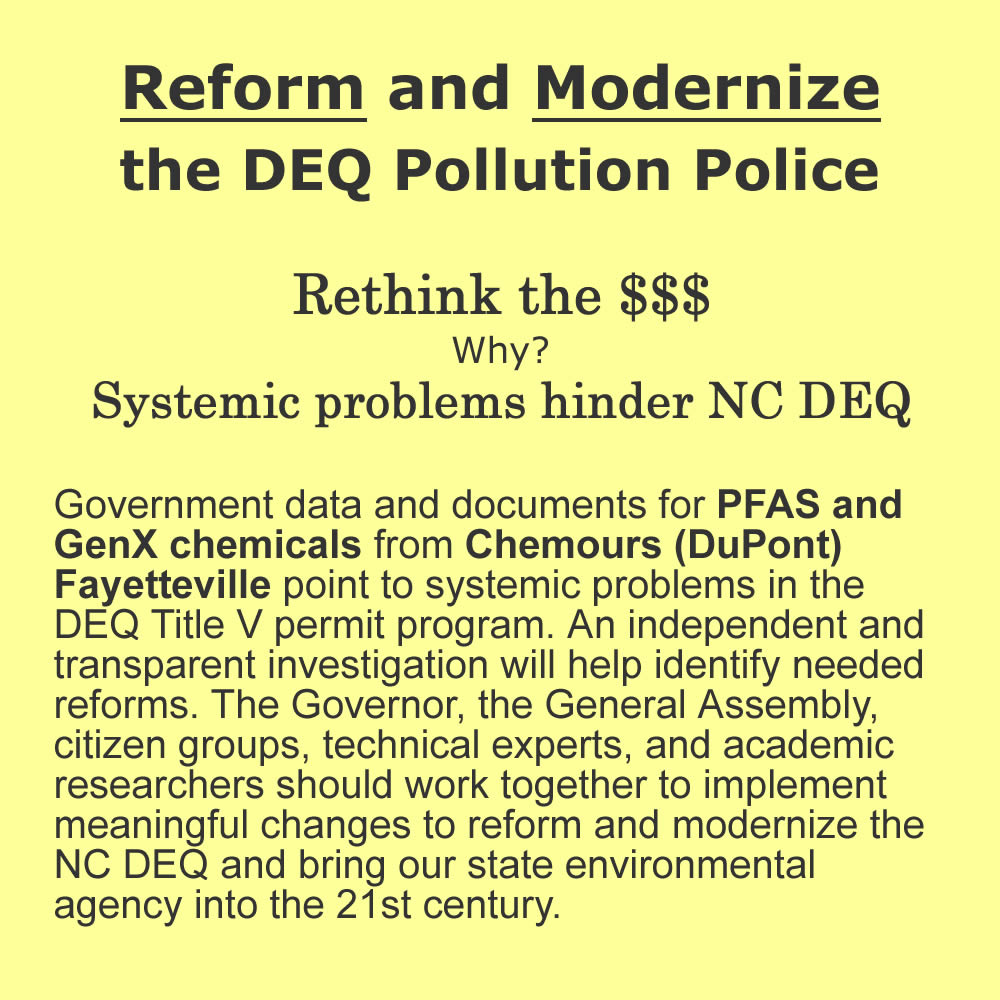

1. The State of North Carolina, in a bipartisan effort, should provide "immediate relief funds" to downriver communities and individuals that have water contaminated with PFAS and GenX chemicals from the Chemours (DuPont) Fayetteville environmental disaster.
2. The Office of the Attorney General, working with other appropriate entities, should attempt to recover some, if not all, of the "immediate relief funds" from the two chemical companies.
3. An investigation should be conducted of NC DEQ's handling of Chemours (DuPont) Fayetteville Works, including a close review by independent experts of the DEQ Division of Air Quality's inspection and permit programs. Government data and documents suggest that the NC DEQ is one of the "responsible parties" for the Chemours (DuPont) GenX chemicals environmental disaster. Specifically, the evidence points to how the DEQ Division of Air Quality for 12 years (from 2005 to 2017) appeared to help DuPont and Chemours conceal the GenX and PFAS chemicals discharged from the Fluorochemicals Plant (Nafion Vinyl Ethers) along the Cape Fear River near Fayetteville.
4. Current DEQ managers or supervisors who were complicit in concealing information pertaining to the Chemours (DuPont) Fayetteville environmental disaster should step aside from their supervisory positions pending further investigation by the Office of the Attorney General.
5. A Panel of Experts for Oversight of DEQ should be established to ensure transparency, competence, integrity, accountability, and reform as part of ongoing efforts to identify and address systemic problems in the NC DEQ.
6. Working with citizen groups, small business groups, UNC system experts, and the agency's new Environmental Justice and Equity Board, the DEQ should implement reforms to encourage a more transparent, collaborative, modern, competent, and "community friendly" DEQ. Data and documents for Chemours (DuPont) Fayetteville over more than 15 years point to surprising failures in communication, collaboration, and decision-making across three DEQ divisions (Air, Water, and Waste Management). The documents and evidence point to how the DEQ's outdated "Single-silo Director System" of management needs reform and modernization.
7. As part of the effort to make DEQ more community friendly, the agency should elevate the status of the NC DEQ staff members by enabling a public facing web page for each employee to describe their current role, their areas of expertise and interest, their work experience, and their educational background. This should be implemented in a manner that makes it easier for citizens, small organizations, and small businesses to identify and communicate with the DEQ inspectors in the seven field offices.
8a. The DEQ should reform and modernize its organization and operations with a broadening of the knowledge and experience of the agency's "permit writers" and "inspectors" by requiring them to carry out both responsibilities. Cross-media joint inspections for air and water should be resumed for chemical plants and other appropriate facilities, including those using "scrubber" systems that discharge to wastewater treatment systems. The modernization process should encourage, reward, and promote DEQ employees who strive to gain valuable experience, including conducting regular inspections, across the various DEQ agency silos (water, air, land, and waste).
8b. Going forward, individuals wishing to serve as division directors, deputy directors, section heads, or regional office supervisors should have significant knowledge and experience in most if not all key areas of environmental science including water resources, air pollution, land quality, and waste management. The overall goal of the modernization effort should be to increase the effectiveness of the DEQ, helping the agency "work smarter" and make better use of limited resources, as well as significantly improving the organization's ability to do science 101 for the pollutants that move between air, water, land, and waste.
8c. As part of efforts to reform and modernize North Carolina's environmental agency, the NC DEQ Honor Code should be clearly posted in all DEQ conference rooms. The posting of the Honor Code should emphasize that it applies to everyone, including division directors and other entrenched, upper-level state government officials. The Office of the Attorney General should create an effective system for DEQ staff to report egregious misconduct and cover-up by entrenched state government bosses.
END
".. Whereas all people in North Carolina, regardless of race, income, culture, religion or zip code, should have access to clean air, clean water, clean soil and the opportunity to live in safe and healthy communities ... " --- from the charter of the DEQ's Environmental Justice and Equity Advisory Board.

